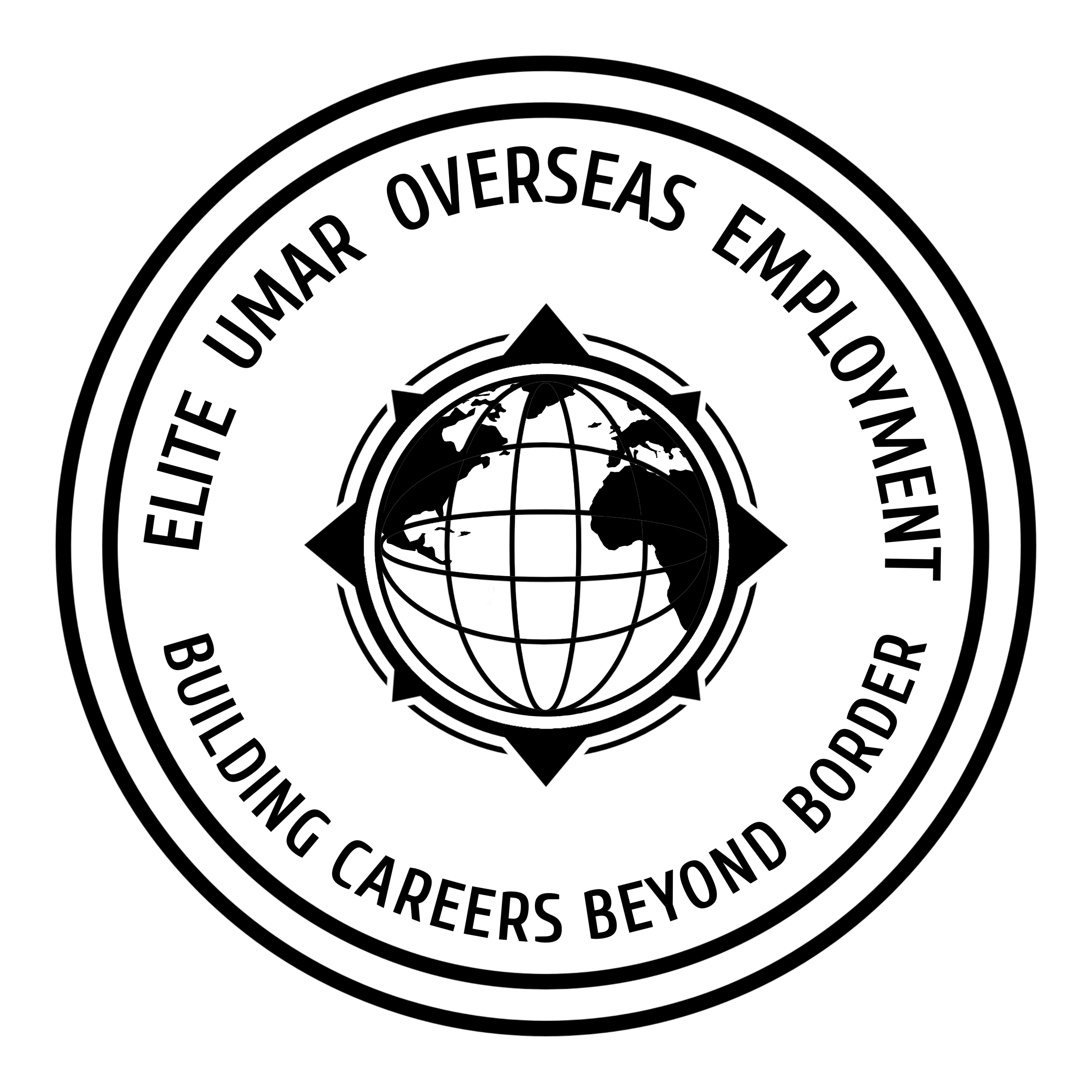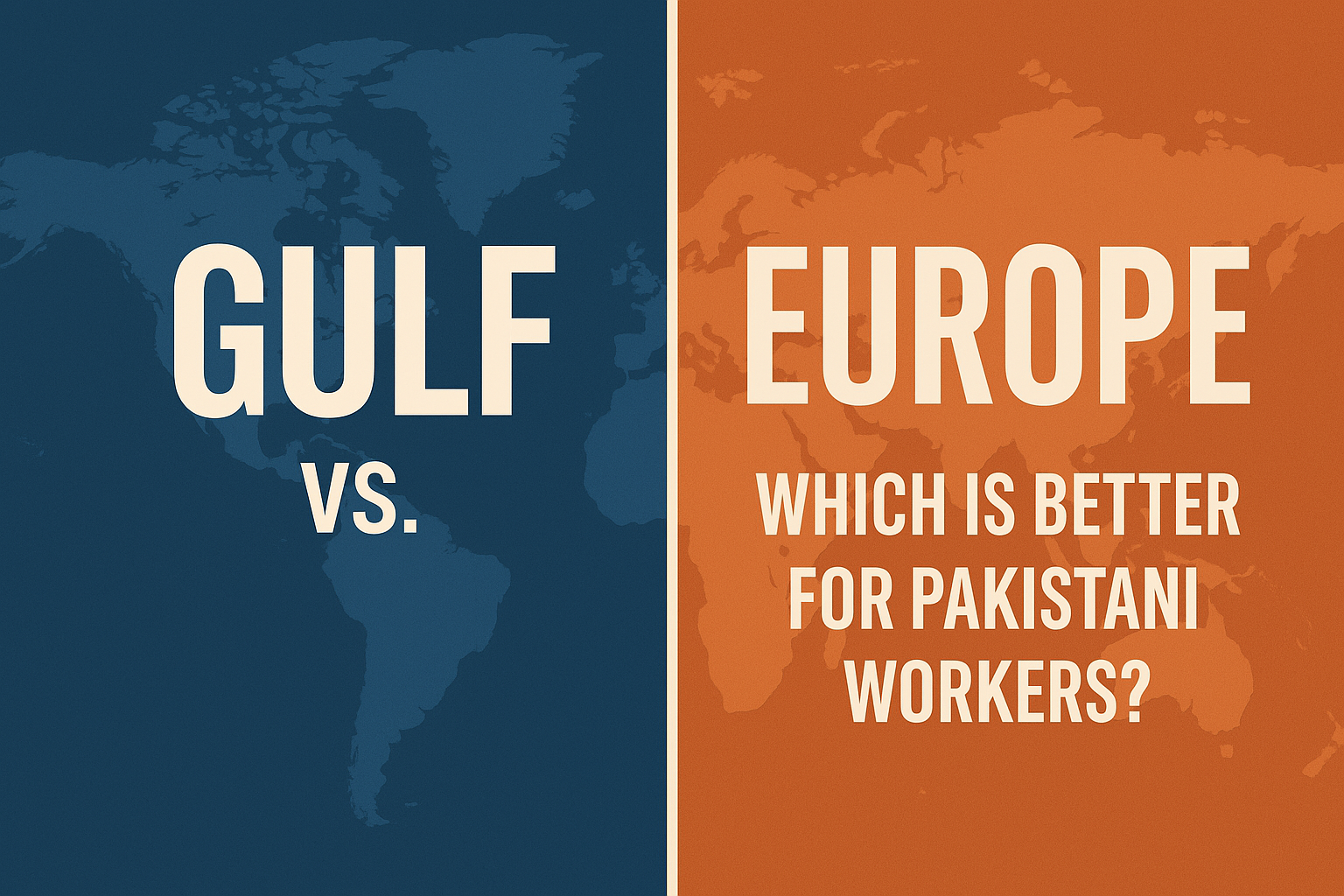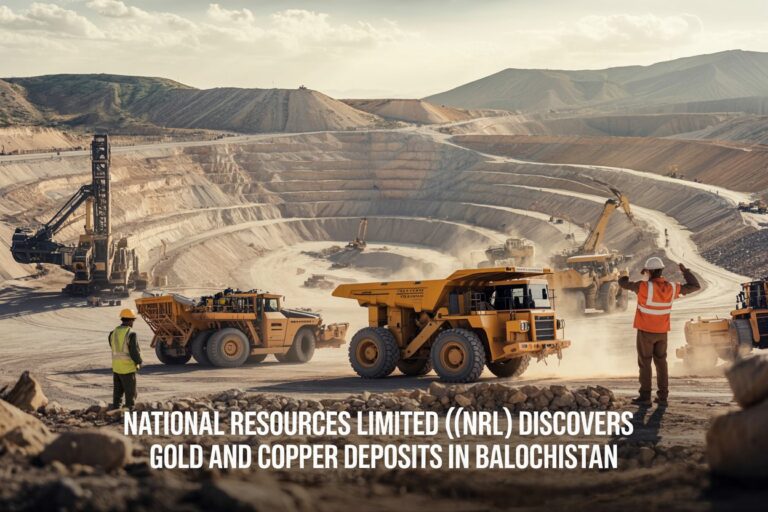Gulf vs. Europe: Which is Better for Pakistani Workers?
Gulf vs. Europe: Which is Better for Pakistani Workers?
Many Pakistani workers seeking employment abroad often face a critical question: Should they pursue job opportunities in the Gulf countries or Europe? Both regions offer financial stability, career growth, and better salaries compared to Pakistan, but each has unique advantages and challenges. This article provides a detailed comparison of employment prospects, salaries, work conditions, visa processes, and long-term benefits in both regions to help Pakistani workers make an informed decision.
1. Job Opportunities and Demand
Gulf Countries:
- High demand for both skilled and unskilled workers in industries such as construction, security, hospitality, and healthcare.
- English is widely accepted, making communication easier for Pakistani workers.
- The recruitment process is faster, with visa approvals typically taking between 2 to 3 months.
Europe:
- Higher demand for skilled professionals in fields like IT, engineering, healthcare, and finance.
- Factory jobs and farm work are available but require competition with other foreign workers.
- Many European countries require proficiency in their local language for employment.
- Work visa approvals take longer, often between 6 to 12 months.
Conclusion: The Gulf is better for immediate job placement, while Europe offers more opportunities for skilled professionals willing to navigate language requirements and longer processing times.
2. Salary Comparison
Gulf Countries:
- Salaries typically range from 1,200 to 5,000 SAR/AED (PKR 90,000 to 375,000) per month.
- No income tax, meaning workers take home their full salaries.
- Many employers provide free accommodation, transportation, and food, reducing personal expenses.
Europe:
- Salaries range from €1,200 to €3,500 (PKR 360,000 to 1,050,000) per month.
- Income tax deductions range from 10% to 30% of earnings.
- Workers are responsible for their own accommodation, transportation, and utilities, increasing living costs.
Conclusion: The Gulf allows workers to save more due to tax-free earnings and employer-provided benefits, while Europe offers higher gross salaries but higher living expenses.
3. Cost of Living
Gulf Countries:
- Accommodation is often employer-provided, reducing housing costs.
- Daily expenses such as food and transportation are relatively affordable.
- Extreme weather conditions require adaptation, but most work environments are air-conditioned.
Europe:
- Housing is expensive, with rent costs ranging from €500 to €1,000 per month for a single-room apartment.
- Cost of living, including food, utilities, and transport, is significantly higher than in Gulf countries.
- Weather conditions vary but may be more comfortable for those unaccustomed to extreme heat.
Conclusion: The Gulf has a lower cost of living, making it easier for workers to save money, whereas Europe requires higher monthly expenses for essentials.
4. Work Visa and Immigration Process
Gulf Countries:
- Work visas are employer-sponsored and typically processed quickly.
- No pathway to permanent residency (PR) or citizenship; workers must leave if they lose their job.
- Some countries require a No Objection Certificate (NOC) to switch employers.
Europe:
- Work visas take longer to process but can lead to permanent residency and, eventually, citizenship.
- Many European countries allow workers to bring their families after obtaining PR.
- Certain countries (e.g., Portugal, Italy) offer citizenship after five years of residency.
Conclusion: Europe provides better long-term settlement opportunities, while the Gulf is more suitable for short-term employment.
5. Family Settlement and Future Prospects
Gulf Countries:
- Difficult for workers to bring their families unless earning a high salary.
- No permanent residency or nationality for workers’ children.
- Long-term employment is uncertain as job security depends on employer sponsorship.
Europe:
- Easier to bring family members after securing PR.
- Some countries grant citizenship to children born within their borders.
- Workers can settle permanently and build a stable future.
Conclusion: Europe is the preferred choice for those seeking long-term stability and family settlement, while the Gulf remains ideal for temporary employment and financial savings.
6. Working Conditions and Labor Rights
Gulf Countries:
- Standard work hours range from 8 to 12 hours per day, six days a week.
- Labor laws generally favor employers, and salary delays can be an issue in some cases.
- Strict social and legal regulations, including restrictions on freedom of speech and alcohol consumption.
Europe:
- Standard work hours are eight hours per day, five days a week.
- Strong labor laws provide worker protections, including paid holidays, medical insurance, and unemployment benefits.
- Greater personal freedom and work-life balance.
Conclusion: Europe offers better labor rights and working conditions, while the Gulf has longer working hours with fewer worker protections.
Final Comparison: Gulf vs. Europe
| Factor | Gulf | Europe | Winner |
|---|---|---|---|
| Job Availability | Easier, faster recruitment | More skilled jobs, but longer process | Gulf |
| Salary | Moderate, tax-free | Higher, but taxed | Gulf |
| Cost of Living | Lower (free housing, transport) | Higher (self-paid expenses) | Gulf |
| Visa & Immigration | Quick visa, no PR | Slow visa, but PR & citizenship | Europe |
| Family Settlement | Difficult | Easier with PR | Europe |
| Working Conditions | Longer hours, strict rules | Better labor laws | Europe |
Final Recommendations
- Choose the Gulf if you need immediate employment with tax-free income and plan to work for a short period before returning to Pakistan.
- Choose Europe if you seek long-term stability, permanent residency, and family settlement despite the longer visa processing time.
For Pakistani workers seeking overseas employment, the best option depends on individual goals and circumstances. Those prioritizing quick job placement and savings may find the Gulf more suitable, while those aiming for long-term residency and career growth should consider Europe.
For professional guidance and legal job placement in the Gulf or Europe, contact Elite Umer Overseas Employment for expert assistance.







